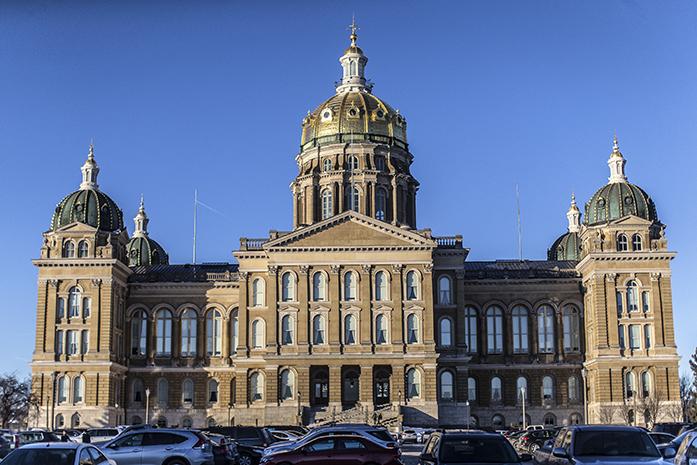Free-speech bill moving through Iowa Senate following court ruling against UI
The bill aims to protect free speech on Iowa college campuses, but some are accusing it of allowing for discrimination.
The Iowa State Capitol is shown on Tuesday, Jan. 13, 2015.
February 10, 2019
First Amendment rights are up for debate in the Iowa Statehouse amid a controversial court case around religious liberty.
Senate Study Bill 1099, a bill addressing First Amendment rights and regulations on college campuses, passed a House subcommittee meeting on Feb. 7, and it will move on to the Education Committee.
The bill would designate the outdoor areas of campus as a “traditional public forum,” which would allow all expression protected under the First Amendment, prohibit designated free-speech zones on campuses, and provide increased protections for invited public speakers. Additionally, the bill contains provisions regarding how universities can regulate student-group conduct.
The bill discussion comes fresh on the trail of a court ruling stating the UI didn’t apply its human-rights policy correctly toward Business Leaders in Christ, a Christian student organization.
The UI deregistered Business Leaders in 2017 after then-sophomore Marcus Miller filed a complaint claiming the organization violated UI Human Rights Policy when it revoked his leadership position upon finding out he was gay.
RELATED: Court rules UI discriminated against student group
U.S. District Court Judge Stephanie Rose, who delivered the ruling, said the UI Human Rights Policy is sound, but it wasn’t enforced consistently across student groups.
The bill states “a public institution of higher education shall not deny any benefit or privilege to a student organization based on the student organization’s requirement that the leaders of the student organization affirm or agree to the student organization’s beliefs or standards of conduct or further the student organization’s mission.”
The Iowa State Education Association, an organization that represents Iowa high-school and community-college instructors, came out in opposition to the bill. Melissa Peterson, a lobbyist for the group, said the bill allows legal discrimination.
“We think that this is kind of a license to discriminate,” Peterson said. “The bill would, in our opinion, actually not protect free speech. It would, in fact, allow student groups to discriminate against some of our protected classes.”
Lobbyists for the state Board of Regents have registered their position on the bill as “undecided,” signaling the bill is important to them, but they have not chosen a position.
Sen. Tim Kraayenbrink, R-Fort Dodge, said he hoped the bill would help make college campuses politically neutral by protecting public speech on campus. He said Iowa State students at the meeting reported facing bias on campuses.
“Being the [vice chair] of the Appropriations Committee, it kind of bothers me when there’s public funds going to a public university and their students that are attending the school have to go there knowing they are going to be exposed to liberal bias,” Kraayenbrink said.
Sen. Herman Quirmbach, D-Ames, said he supports most of the contents of the bill. Quirmbach said the protections for speech laid out in the bill were valuable, but the bill went too far and allowed for discrimination.
RELATED: UI expels Christian student club over leadership requirement
The one point of contention came with the section on student organizations. Quirmbach takes particular issue with the phrase “standard of conduct.”
“That’s where it gets really messy,” he said. “Because standard of conduct is often hard to distinguish from status.”
Quirmbach said in its current wording, the bill would allow for discrimination on the basis of such legally protected statuses as gender, sexuality, and religion. Quirmbach said he hoped the Republicans could add compromising language to address his concerns.
“The underlying principle is something I’m very concerned about, so except for those four words, I love the bill,” he said.






